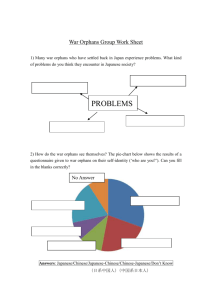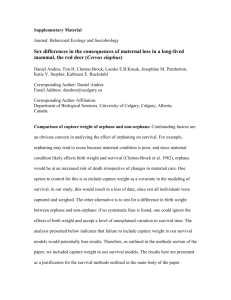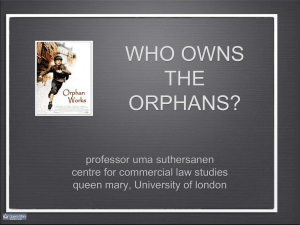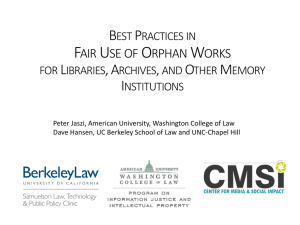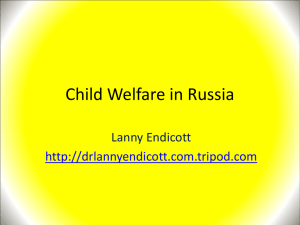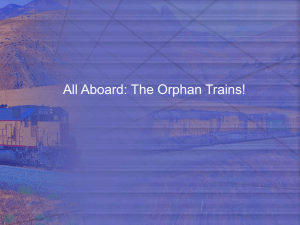The Orphan Crisis in sub-Saharan Africa.
advertisement
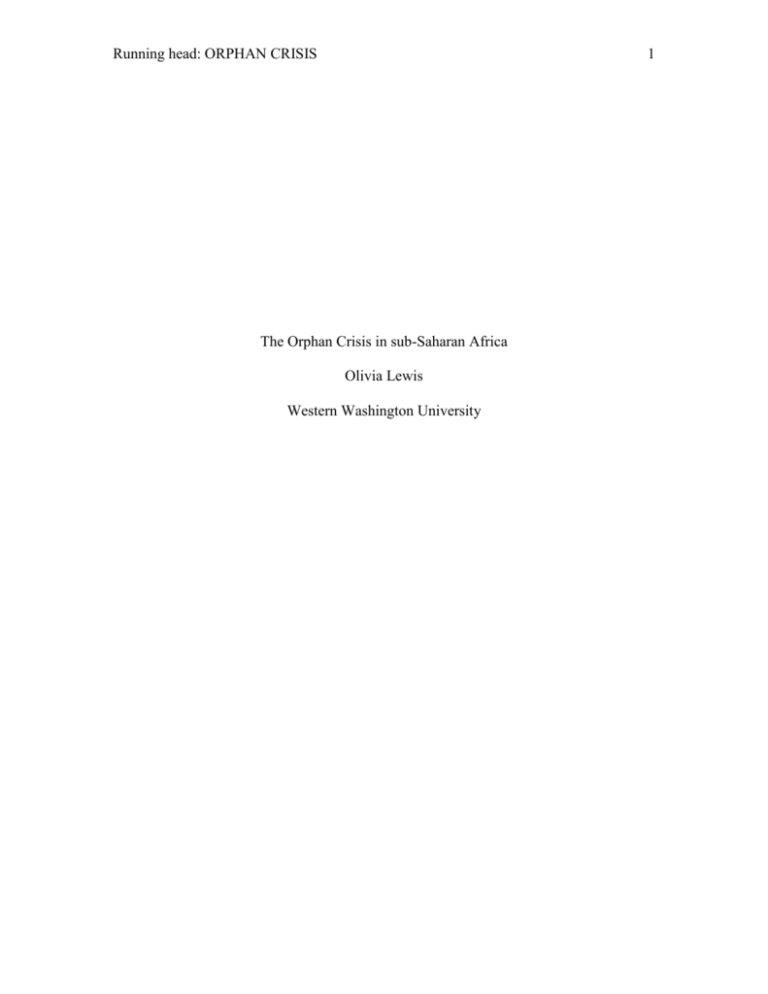
Running head: ORPHAN CRISIS 1 The Orphan Crisis in sub-Saharan Africa Olivia Lewis Western Washington University ORPHAN CRISIS 2 ABSTRACT The following research proposal looks at the orphan crisis taking place in sub-Saharan Africa countries from a perspective that has not been shown before: the family themselves. With the number of orphans reaching an unimaginable number, a solution is needed now more than ever. This proposal will use a formative program evaluation approach, collecting both qualitative and quantitative data through surveys and interviews with those directly related to or in contact with orphans in sub-Saharan Africa countries. The hope for this proposal is to identify the problem, evaluate possible solutions, and stir people to take action. With the data being collected from those affected most, the results will be as real as possible. I will analyze the data by creating graphs and comparing the results potentially leading to these countries reevaluating the laws regarding the care of orphans. ORPHAN CRISIS 3 When someone thinks of Africa a few different adjectives might come to mind dirty, poverty, hungry, or struggling to name a few. Images of skin and bone children might come up, along with visions of shacks lined up in a garbage dump, or long dusty roads. You might think sub-Saharan Africa countries are incompatible or hopeless. When it comes to the stability of sub-Saharan Africa countries, our society seems to identify the problem, categorizes the issues, blame the guilty parties and then not do much to solve the problem. We tend to have no problem exposing faults, but lack the ability to support strengths. Despite its lack of media coverage, one of the most significant problems in subSaharan Africa countries is the orphan epidemic. With the number of orphans passing 18 million in 2010 (Hodgins, 2010) and expected to reach 18.4 million by 2012 (Roby & Shaw, 2006) it seems almost impossible to categorize. The key concept of my research proposal is to compare and analyze the approaches that sub-Saharan Africa countries are taking to help decrease the rising numbers of parentless children and how international support is helping and hurting the Africa countries as a whole. Each country has a different strategy, some better than others. My research proposal will address many questions; for example, why do some countries believe that the extended families taking care of the orphans is the only option while other countries turn towards international adoption in hopes of lowing the numbers of children being without a family? Which approach is most effective? Why are some countries so firm on their policies while others seem to flip flop on a regular basis? Is there a solution? If so, what is it? How are international governments helping the cause? How are they hurting it? Can other countries bring more stable numbers to this crisis? As the number of orphans is predicted ORPHAN CRISIS 4 to increase rapidly over the next few years, finding a solution is crucial. This research proposal will hopefully bring light to a daunting topic that seems to often be overlooked. REVIEW OF LITERATURE The increasing number of orphans in sub-Saharan Africa is daunting to think about. With the number of orphans passing 18 million in 2010 (Hodgins, 2010) and expected to reach 18.4 million by 2012 (Roby & Shaw, 2006) the scale of this crisis is difficult to fully comprehend. The loss of parents has immeasurable consequences: orphans are more likely to face malnutrition, mental illness, educational disadvantages, child labor, and suffer from social exclusion (Kidman, Heymann, & Petrow, 2007). The largest thief of life in sub-Saharan Africa and the main reason why the orphan crisis is rising is because of the AIDS epidemic. “In Africa, AIDS has meant that childhood is lost for many children, who have prematurely taken on the adult role of caregivers and guardians” (Baggaley & Needham, 1997, p 34). In Zambia alone, AIDS has left 500,000 children without a family (Baggaley & Needman, 1997). Many different approaches have been taken in the last few decades to deal with the growing orphan crisis. One research article discussed how some sub-Saharan countries turn to extended families in hopes of taking care of orphans (Wilson Quarterly, 2009). “The placing of orphaned children with extended families, in a situation similar to foster care, is a sensible solution, because it supports tradition and the healthy development of the child” (Hodgins, 2010, p 44). Throughout sub-Saharan Africa, extended families are caring for more than 90 percent of children (Roby & Shaw, 2006). In countries were the average worker makes $25 per month to feed, house, and support an entire family struggle is inevitable, especially when the extended families continue to ORPHAN CRISIS 5 grow due to disease (Baggaley & Needman, 1997). The Canadian Medical Association Journal’s research article discussed that with extended families taking in orphaned children, resentment is a common theme from both the child and the family. These children have not only lost their parents but they also have to deal with the transition into a new life, which sometimes includes “over and subtle physical abuse and neglect” (Baggaley & Needman, 1997) from the extended family. Many people ask themselves what is the best solution for the children (Wilson Quarterly, 2009)? According to Roby and Shaw (2006), “Although strengthening the family remains the primary goal, community efforts have coalesced to provide support for orphans”. In some situations having orphans be cared for by extended families is not an option (Wilson Quarterly, 2009). Another solution countries utilize is centers or orphanages to take care of the increasing number of abandoned children. “Bana ba Keletso Orphan Day Care Centre provides centralized care for over 355 orphans aged 2-18 in the urban villages of Molepolole, Botswana” (Heymann, Kidman, & Petrow, 2007, p 73). A similar community based organization in Cape Town, South Africa has two different outreach programs for the increasing number of orphans in their area (Heymann, Kidman, & Petrow, 2007). This organization utilizes both indirect and direct service in helping the orphans in and around Cape Town. Many organizations in South Africa have modeled their approach after Ikamva Labantu; this has positively influenced the crisis in South Africa (Heymann, Kidman, & Petrow, 2007). The research article by Miriah Hodgins (2010) states that although international adoption is slowly becoming a dominant solution, it is still not as common as one might think. “The number of children adopted in 2006 from the leading source country, ORPHAN CRISIS 6 Ethiopia, reached only 732” (Wilson Quarterly, 2009, p 2). A country’s openness to adoption is not determined by the severity of the orphan crisis, the prevalence of AIDS, or the level of democracy in the orphans’ land, as it should be (Wilson Quarterly, 2009). Instead the decision is more likely to be based on domestic politics (Wilson Quarterly, 2009). The proposal of international adoption is not vastly popular in sub-Saharan Africa countries because of racism, racial and cultural identity developing, and the potential legal risks (Roby & Shaw, 2006). Even countries that do allow or even advocate for international adoption often have seemingly impossible requirements for adopting families (Hodgins, 2010). Some countries in sub-Saharan Africa use their strict international adoption policies as a way to manipulate America. “Clamping down on adoption seems to many leaders like a relatively cheap way to stand up to Uncle Sam” (Wilson Quarterly, 2009). Miriah Hodgins research goes into detail about the requirements that need to be met in order to adopt from specific sub-Saharan Africa countries. For example, “orphans are less likely to go to homes with lots of children” (2010); even if that particular family had the means to support to the child. In light of the tradition of keeping the orphans in the family and the strict requirements for adoption, there are emerging signs that the international community is mobilizing (Wilson Quarterly, 2009). “As a significant step, in 2001 the UN General Assembly Special Session made specific commitments to address the orphan crisis” (Roby & Shaw, 2006, p 78). Even as the international platforms are beginning to take action at the family, community, national, and international levels much more action is needed to create real change (Roby & Shaw, 2006). ORPHAN CRISIS 7 METHODS My research proposal will strive to answer these questions: How do sub-Saharan Africa countries manage the ever-growing orphan epidemic? Do they utilize the extended families? Do they send the orphans to care centers? Do they focus their efforts on international adoption? What is the best approach and why? For the purpose of this study the term orphan will be defined as any child living without both biological parents and the term sub-Saharan Africa refers to the countries south of the Sahara desert. Research Design The research approach I will be using is formative program evaluation to examine the planning, development, and implementation of the orphan programs in sub-Saharan Africa countries. My research proposal is just the beginning of the work needing to be done to help the orphan crisis; because of this, formative program evaluation is the best option. As Marlow (2011) says, “This type of evaluation is often performed as an initial evaluative step and is generally descriptive” (p 41). Marlow also talks about how the formative program evaluation is useful for someone who is processing multiple perspectives, which is ideal for my population of diverse people. Participants & Instrument My proposal will answer the questions listed at the beginning of this section by evaluating the current systems being used and opinions about those systems through the instrument of surveys. The participants taking the survey will be gathered through stratified random sampling. I have chosen this probability sampling method because it is a combination of the simple and systematic methods. The participants of my proposed research will be anyone involved in caring for orphans (extended family, care givers, etc). ORPHAN CRISIS 8 Data Collection I will be collecting both qualitative and quantitative data. Qualitative because the “primary interest is in description rather than explanation” (Marlow, 2011, p 11). I know that I will not be able to find well thought out explanations as to why some countries use a particular approach, but finding descriptions will be much easier. I will be collecting quantitative data by studying a large number of subjects around a central concern (Marlow, 2011). I will use this method because of deductive reasoning - which involves “drawing conclusions from the general to the particular” (Marlow, 2011, p 10). The population I will be surveying is going to have general opinions, by using deductive reasoning I will be able to bring the general opinions to a more particular viewpoint and find the answer to the research question. Data Analysis I will organize my data by creating graphs and tables with the survey results. I will analyze my data by comparing and contrasting the graphs and tables. I will use deductive reasoning to draw conclusions on the thoughts and feelings surrounding the care of orphans. FEASIBILITY The feasibility of my research proposal has many factors including limitations and constraints that will contribute to the success of my proposal. Most of the countries in sub-Saharan Africa do not keep up-to-date records of children and their families thus resulting in a lack of information. When it comes to finding the history of a child many officials come up empty handed, which will cause a roadblock when trying to find appropriate participants. The research articles I found that helped me to formulate the two ORPHAN CRISIS 9 sides of my proposal, one being orphans in the care of extended family members and the other being orphans adopted internationally, have assumptions and biases because of the locations they chose, villages they focused on, and viewpoint they started from. I will need to keep this information in mind as I formulate my survey. There are ethical considerations on both sides of the research. Some countries have religious beliefs that do not support adoption and turn to alternative routes such as sending orphans to care centers or neighboring villages to bring stability to the orphan crisis. The goal of my proposed research is to find a solution for the ever-growing number of children without a family and although most research does lean towards international adoption being the most sensible solution, the ethics and traditions of a country are important to keep in mind. Many decisions regarding the care of orphans are made based on social, political, and economic implications. Some countries utilize extended families because of social expectations and traditions, while other countries want children to stay in their home country because of political popularity. For example, some leaders create a platform built on ‘keeping families together’ and create a fan base around that idea (Hodgins, 2010). Although this platform in theory is admirable, it is not always easily executed because of many different circumstances. A few countries utilize international adoption because of the economic gain that comes from adoption fees. All of these viewpoints play a significant role in the outcome of my research proposal because bias and assumptions will occur when participants are completely the surveys or interviews. Many sub-Saharan Africa countries have the potential to benefit from my proposed research. By reviewing my results they can analyze the approach they are ORPHAN CRISIS 10 currently taking and assess the successes and failures. My research proposal will provide these countries with a viewpoint that is not currently available. The voice of the orphan and their families is often silenced in the media, but with my survey and interviews they will be heard. This proposal is based on the hope that the individual viewpoint will be seen in a light that has not been shown yet. ORPHAN CRISIS 11 BIBLIOGRAPHY Baggaley, R. C., & Needham, D. (1997). Africa’s emerging AIDS-orphans crisis. CMAJ: Canadian Medical Association Journal. 156(6), 873. Breuning, M. & Ishiyama, J. (2009). Africa’s Orphans. Wilson Quarterly. 33(3), 86-87. Hodgins, M. (2010). Should we keep it in the family?: Caretaker preference for orphan care in Yako, Burkina Faso. 7(1), 43-51. Kidman, R. R., Petrow, S. E., & Heymann, S. J. (2007). Africa’s orphan crisis: two community-based models of care. AIDS Care. 19(3), 326-329. Doi:10.1080/09540120600608396 Roby, J. L., & Shaw, S. A. (2006). The African orphan crisis and international adoption. Social Work, 51(3), 199-210. ORPHAN CRISIS 12 Appendices: THOUGHTS AND FEELINGS OF HOW ORPHANS ARE CARED FOR CONSENT FORM Principal Investigator: Olivia Lewis Human Services Student Western Washington University DESCRIPTION: I am interested in the thoughts and feelings of people related to or familiar with the care of orphans in sub-Saharan Africa countries. You, as someone taking care of, working with, or being around orphans, are the best possible resource to describe these thoughts and feelings. This research study will include one survey (10 questions) and possibly one interview lasting approximately 20 minutes. CONFIDENTIALITY: Your name and information will not be attached to your survey or interview. Your name and any other identifiers will be kept in a secure file and will only be accessible to me and my research associates. If any information is published from this study, your name will not be. BENEFITS: Your thoughts and feelings of the care of orphans have the potential to change the way sub-Saharan Africa countries take care of them. RISKS: There is potential that answering the questions might trigger emotions that make you sad or uncomfortable. However, there is no other known risk to you. CONTACT PEOPLE: If you have any questions or concerns about participating in this research please feel free to contact the principal investigator listed above. Our first concern is your safety and comfort. VOLUNTARY NATURE OF PARTICIPATION: Your participation in this study is voluntary. If you decide not to participate, or wish to stop participation at any time there will be no penalty or less of benefit to you. In other words, you are free to make your own choice about involvement in this research. ORPHAN CRISIS 13 SIGNATURE: Your signature on this consent form indicate that you understand the above study, what is being asked of you, and that your involvement is voluntary. Thank you! We look forward to working with you. Signature: ______________________________________________ Date: _________________________ ORPHAN CRISIS 14 THOUGHTS AND FEELINGS OF HOW ORPHANS ARE CARED FOR SURVEY As the consent form explained your participation is voluntarily and can be terminated at any time. Please do not hesitate to ask questions or seek clarification. Directions: Complete this 10-question survey to the best of your ability by circling the answer you prefer. 1. How familiar are with the concept of international adoption? (Circle the best answer) A. Very familiar B. Somewhat familiar C. Not very familiar D. Have not heard about it If you answered A or B to #1 2. Do you believe that international adoption is a positive solution to the orphan crisis? A. Yes B. No If you answered C or D to #1 3. Are you interested in learning more about the concept of international adoption? A. Yes B. No 4. Do you believe extended family members should care for orphans if possible? A. Yes B. No 5. Has your family faced additional struggles from having the orphan(s) in your care? A. Yes B. No 6. Has your family benefited in any way from having the orphan(s) in your care? A. Yes B. No 7. Do you think the orphan in your care would be better off in a different situation? A. Yes B. No 8. Do you think care centers or orphanages are an effective way to take care of the orphans? A. Yes ORPHAN CRISIS B. No 9. Do you think the government of your country is sensitive towards the situations the orphans are in? A. Yes B. No 10. Do you believe that the orphan crisis is a problem? A. Yes B. No 15
